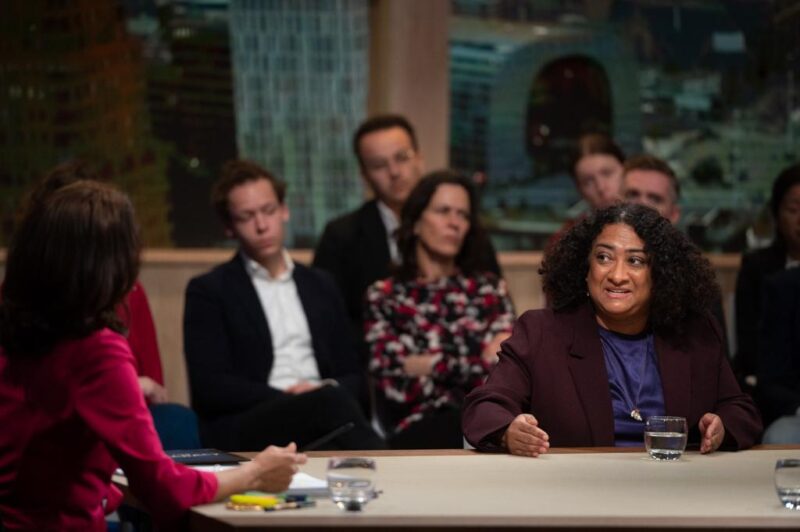The future of journalism is about the future of public conversations. How do we communicate with one another, how do we access information we need to live our best lives, and how do we hold power to account. The best conversations are dialogues, where people listen to each other, respond to each other’s needs and preferences, and find a common space to resolve problems.
The media is a key part of this public conversation, which is precisely why those who seek to suppress open dialogues would prefer that public space was dominated by monologues.
Internews has worked in this space for four decades, supporting journalists and information providers worldwide to create healthy information environments that facilitate informed decision making. And it is clear that this work is more important than ever.
The digital transformation of our information environments, which allows us to communicate at speed and across borders, has multiplied opportunities for public conversations of the best kind.
But it has also opened the door to forces that make it harder for all voices to be heard.
To stay viable and relevant, journalism has to recognize how and where it is being attacked and then adapt.
The first set of challenges digitalization brought to the media sector were financial. Technology companies, that held vast, detailed datasets of their users, upended the traditional advertising-funded model of journalism. Advertisers in turn realized that media outlets were no longer the main or most effective way to reach potential customers.
Alongside this, political leaders also realized that social media offered ways to communicate directly with their potential voters that bypassed traditional media outlets. This dual loss of money and influence has left journalism under threat.
It has been accompanied by a rapid and vast rise in disinformation that has distorted information environments worldwide and led to a fractured, polarized public space where there is little consensus around facts.
Journalism needs to look clearly now at the new set of challenges it faces, and find ways to respond in a way that ensures people can access the information they need to make informed decisions. These are five areas where Internews is working with journalists and communities to help.
1. Rising inequalities
One of the biggest threats to journalism comes from a falling away of trust in the media. This is often linked to a general mistrust of institutions, driving by rising inequalities that lead to a sense among communities that those in power do not have their best interests at heart, as illustrated by this Internews report on how inequalities drive mistrust of health information.
Traditional media organizations have often been slow to address this in their own newsrooms in making sure journalists and editors are themselves representative of and understand the communities they seek to reach, but this is changing. New digital outlets in particular can rise out of local communities and respond to their needs but they rely heavily on technology platforms to reach their audiences, and this reliance often makes them vulnerable to changes in strategy and algorithms.
2. Changing technologies
Platform companies have dominated the news ecosystem in the last decades but even as policy makers and news organizations grapple with how to deal with the changes they have introduced into news environments, the companies themselves are changing. Not just by name, from Facebook to Meta and Twitter to X, but by stepping away from news and from civil society partners who had been working with them on responses to disinformation. This disengagement comes precisely as Artificial Intelligence, including generative AI such as Chat GPT, is upending norms over what and who generates content online.
3. Climate change
The issue of climate change also poses one of the biggest threats to journalism, and tests its ability to cover a global, complex, multi-faceted story over a period of decades in a way that keeps audiences interested, engaged, and empowered.
Climate change hits already marginalized communities hard and these are the ones that need most urgently to take adapt to their changing environments. Research already shows that people often face informational barriers, lacking the relevant and accessible information they need to make informed decisions. Journalism needs to adapt to these needs, and change their entire way of operating to ensure the climate story is covered effectively and with the urgency it needs.
The Earth Journalism Network supports journalists worldwide in meeting these challenges head on, and ensures that those covering the most marginalized communities have their voices heard.
4. Disinformation
Disinformation comes in many forms, from rumors spread on WhatsApp to propaganda spread on state-controlled television in authoritarian-minded countries. It contributes, directly, to democratic backsliding and distorts public debate. Digitalization here again offers threats and opportunities. Threats in that it is easier than even to post lies online that will reach vast numbers of people in seconds. Generative AI makes it easier to create convincing misinformation. But there are also opportunities to disseminate facts in spaces where censorship and political control limit what more traditional media organizations can say. In Central Asia, digital outlets in local languages are reaching younger audiences, who want an alternative to state-controlled Russian-language outlets.
5. Attacks on media
Internews recognizes that journalists worldwide are coming under sustained physical, legal and digital attack in the course of their work. Much of these attacks are gendered – women journalists and civil society actors face high levels of highly personalized and violent threats online, many of which translate into real world harm. Journalists are also increasingly at risk in demonstrations and protests, where both police and protestors view them with mistrust. In addition, many governments are introducing laws that curtail free speech and independent media, often under the guise of legislation designed to attack misinformation. Drawing attention to these issues and supporting journalists as they find strategies to cope with the pressures they come under, is a core part of what we do.
If you would like to help Internews in supporting independent journalism worldwide, check out our donation page.
